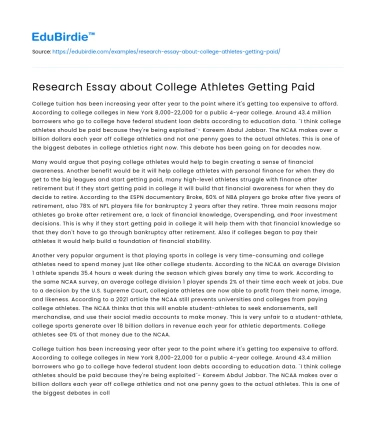Introduction
The debate over whether college athletes should receive financial compensation has gained considerable attention in recent years. As college sports generate substantial revenue for universities, the argument posits that athletes should share in the financial benefits. According to the National Collegiate Athletic Association (NCAA), college sports programs generate billions of dollars annually, yet athletes themselves are often denied a share of these profits. Critics argue that scholarships and educational opportunities are adequate compensation, but this perspective fails to account for the significant personal and financial sacrifices athletes make. This essay explores the rationale behind compensating college athletes, examining economic, ethical, and practical considerations, while addressing the counterarguments to provide a comprehensive analysis of this contentious issue.
Economic Implications of Athlete Compensation
The economic landscape of college sports has transformed considerably, necessitating a reevaluation of the compensation structure for athletes. In 2019, the NCAA reported revenues surpassing $1 billion, primarily from lucrative broadcasting rights, sponsorship deals, and ticket sales. Despite this, athletes, who are pivotal to generating such revenue, receive no direct financial benefit. This disparity raises questions about fairness and equity, as universities and coaches often profit immensely. For example, Nick Saban, head coach of the University of Alabama football team, earns over $9 million annually, highlighting the stark contrast between institutional earnings and athlete compensation.
Save your time!
We can take care of your essay
- Proper editing and formatting
- Free revision, title page, and bibliography
- Flexible prices and money-back guarantee
Furthermore, the potential for economic exploitation is significant. College athletes dedicate extensive time to training and competing, often at the expense of their academic pursuits. This commitment leaves little room for part-time employment, exacerbating financial strains. Providing financial compensation could alleviate these pressures, allowing athletes to focus on both their sport and education. According to economist Andy Schwarz, compensating athletes could also stimulate economic growth by creating additional consumer spending. This economic perspective underscores the necessity of rethinking traditional views on college athlete compensation.
Transitioning to ethical considerations, it is crucial to examine the moral obligations institutions have towards their athletes. As economic arguments build momentum, understanding the ethical implications is equally vital in this debate.
Ethical Considerations and Institutional Responsibilities
The ethical dimensions of compensating college athletes present compelling arguments for reform. Central to this debate is the principle of fairness. Athletes contribute significantly to the success and reputation of their institutions, often at great personal cost. Ethical theories, such as John Rawls' "Theory of Justice," advocate for equitable treatment, suggesting that athletes deserve compensation commensurate with their contributions.
Moreover, the physical and mental demands placed on athletes warrant ethical scrutiny. The risk of injury is inherent in competitive sports, with long-term implications for athletes' health and well-being. These risks further justify financial compensation, as athletes should be adequately remunerated for the potential impact on their future livelihoods. Studies have shown that many athletes, especially those in revenue-generating sports like football and basketball, face heightened physical risks without the security of long-term financial stability.
Counterarguments often cite amateurism and the educational value of scholarships as justifications for maintaining the status quo. However, these arguments fail to recognize that amateurism has become an outdated concept in the context of modern college sports. As the ethical debate unfolds, it is essential to address the practical considerations of implementing compensation systems.
Practical Considerations and Implementation Challenges
Implementing a compensation system for college athletes presents various challenges that must be addressed to ensure its feasibility. One primary concern is the potential impact on the amateur status of college sports. Critics argue that paying athletes could blur the lines between amateur and professional sports, undermining the traditional values of college athletics. However, recent changes in NCAA policies allowing athletes to profit from their name, image, and likeness (NIL) rights demonstrate a shift towards reconciling these concerns.
Another practical consideration is the distribution of funds. Establishing a fair and equitable compensation structure requires careful planning to avoid disparities between different sports and institutions. Smaller colleges with limited resources may struggle to match the compensation levels of larger universities, potentially widening the gap between athletic programs. A tiered system, where compensation is based on revenue generation and athlete involvement, could provide a balanced approach.
Transitioning from theoretical discussions to practical implementation necessitates a comprehensive evaluation of existing systems and policies. By examining successful models from other countries or professional organizations, the NCAA and educational institutions can develop a framework that addresses these practical challenges while prioritizing fairness and equity.
Conclusion
The debate over compensating college athletes is complex, encompassing economic, ethical, and practical dimensions. As college sports continue to generate substantial revenue, the call for athlete compensation grows stronger. Economic arguments highlight the need for equitable distribution of profits, while ethical considerations emphasize the responsibility of institutions to fairly reward athletes for their contributions and risks. Practical challenges, though significant, can be addressed through thoughtful planning and policy reform. By shifting towards a compensation model that reflects the evolving landscape of college sports, institutions can ensure a fairer system that benefits both athletes and the broader academic community. Ultimately, addressing this issue is not merely a matter of fairness, but a crucial step towards modernizing college athletics to reflect contemporary values and realities.






 Stuck on your essay?
Stuck on your essay?

